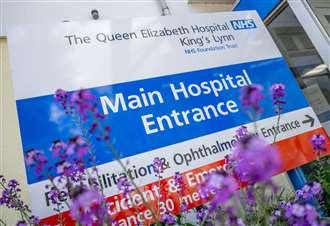
Bids by junior doctors for a 35% pay rise have been slammed by the Health Secretary – who warns that strikes could “risk patient safety”.
Staff at Lynn’s Queen Elizabeth Hospital have been left with no choice but to cancel some elective care procedures, which involve non-emergency surgeries.
This came after junior doctors across the country started a 96-hour walk-out on Tuesday at 7am as they bid for a 35% pay rise.
Patients facing immediate concerns, cancer surgery and trauma are among those being prioritised at the QEH.
Helen Blanchard, the interim chief nurse at the hospital, said: “Our highest priority is to continue to provide safe and high-quality care for our patients and avoid disruption to our services where at all possible.
“We will prioritise resources to protect emergency treatment, critical care, neonatal care, maternity, and trauma, and ensure we prioritise patients who have waited the longest for elective care and cancer surgery.
“Unfortunately some elective care will be cancelled as a result of this, however we will only cancel appointments and procedures where it is necessary and will reschedule immediately, where possible.
“Patients should continue to attend appointments as planned unless contacted to reschedule, and nobody should put off seeking urgent or emergency care.”
Across the UK, an estimated 350,000 appointments and operations have been rescheduled as nearly 50,000 take industrial action.
The QEH could not confirm how many appointments it will have to move, or how many of its staff are taking part in strikes – which end on Saturday at 7am.
Rob Laurenson, the leader of the junior doctors’ union, has faced criticism for going on a week-long holiday just as the striking begins.
Health Secretary Steve Barclay said: “It is extremely disappointing the BMA has called strike action for four consecutive days. Not only will the walkouts risk patient safety, but they have also been timed to maximise disruption after the Easter break.
“I hoped to begin formal pay negotiations with the BMA last month but its demand for a 35% pay rise is unreasonable – it would result in some junior doctors receiving a pay rise of over £20,000.
“If the BMA is willing to move significantly from this position and cancel strikes we can resume confidential talks and find a way forward, as we have done with other unions.
“People should attend appointments unless told otherwise by the NHS, continue to call 999 in a life-threatening emergency and use NHS 111 online services for non-urgent health needs.”
And health chiefs at NHS East of England warned the disruption could be worse than last month’s due to it being a time of year when high levels of staff take annual leave over Easter.
Dr Edward Morris, the body’s regional medical director, said: “There has been a consistent level of intense pressure on hospitals and the wider health systems in recent months, and we begin to leave the busiest winter period in the history of the NHS.
“Due to the timing of this forthcoming action coming out of a long bank holiday weekend, we believe the impact on services and care provision has the potential to be much more significant than previous industrial action and we are urging members of the public to consider how they can stay safe during this time.
“Regardless of any strike action taking place, it is really important that patients who need urgent medical care continue to come forward as normal, especially in emergency and life-threatening situations as the NHS is here to help those who need such care.
“We can only do this with the support and understanding of our communities, if we continue to look out for friends and family and select the alternative help and advice that is available if the situation is not extremely urgent or life threatening.
“Unfortunately, a high number of appointments and procedures are likely to be cancelled where it is necessary, but these will be rescheduled as quickly as possible.”














